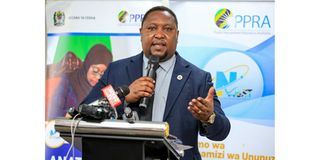E-procurement saves Tanzania $4.9 million in tender document costs

The director general of the Public Procurement Regulatory Authority (PPRA), Mr Dennis Simba. PHOTO | COURTESY
What you need to know:
- The cost-saving is attributed to the adoption of the National e-Procurement System of Tanzania (NeST), which has significantly streamlined and digitised the public procurement process
Dar es Salaam. The Tanzanian government has saved $4.93 million (approximately Sh13.33 billion) during the 2023/24 financial year by reducing spending on paper used in the preparation and completion of tender documents, thanks to adoption of the new electronic procurement system.
The cost-saving is attributed to the adoption of the National e-Procurement System of Tanzania (NeST), which has significantly streamlined and digitised the public procurement process.
Since its rollout on July 1, 2023, NeST has enabled various ministries, departments, and agencies to cut operational costs while enhancing transparency and efficiency in public procurement.
The system has also facilitated procurement of 130,032 tenders with a combined value of Sh14.9 trillion, according to the director general of the Public Procurement Regulatory Authority (PPRA), Mr Dennis Simba.
"The system has significantly reduced the time institutions spend reviewing bidder information and processing tenders. This has cut down the turnaround time during the tendering process," said Mr Simba during a meeting with editors and journalists on May 12.
However, Mr Simba acknowledged several challenges affecting the rollout of the system, including user resistance, limited system knowledge, and technical infrastructure gaps.
One of the key obstacles is reluctance among procurement personnel to adopt the new system.
Many users from procuring entities have found it difficult to transition from previous procurement processes.
In response, PPRA said is continuing to offer education and training to institutions to raise awareness and reduce resistance to change.
A limited understanding of the system among certain institutions, especially local government authorities, has also emerged as a barrier.
Technical difficulties in fully utilising the system remain a concern.
To address this, PPRA, in collaboration with the President’s Office–Regional Administration and Local Government (PO-RALG), has trained 368 champions—two officers from each council—who are expected to provide on-the-ground support in their respective local authorities.
Technical challenges and insufficient ICT infrastructure have further hindered the system’s use, particularly in areas with poor internet connectivity.
To improve access, the government is working with the Universal Communications Service Access Fund (UCSAF) and internet service providers to upgrade ICT infrastructure.
Mr Simba further noted that from July 2023 to date, NeST has facilitated the issuance of tenders worth over Sh15 billion to special groups and enabled procurement at lower administrative levels.
“Since the launch of the Lower Level Module, institutions at the grassroots have uploaded procurement plans worth Sh1.5 trillion into the system, comprising 139,080 tenders. Out of these, 122,937 tenders valued at Sh947.16 billion have already been announced,” he added.
To increase accessibility, the authority has also introduced a mobile application tailored for procuring entities at schools, health centres, villages, and wards.
“This app allows suppliers to access tender information and apply from wherever they are. The goal is to ease public procurement processes at all levels,” Mr Simba explained.
As part of the five-year NeST implementation plan, Mr Simba said the authority plans to introduce two new modules in the 2025/26 financial year: an e-Auction module and an e-Catalogue/Marketplace.
“We are also finalising research on price caps for selected items to be listed on the NeST platform. These caps will help control inflated pricing in government procurement,” he added.
Meanwhile, Tanzania Editors’ Forum (TEF) Vice Chairperson Bakari Machumu commended the system’s transparency, stating it has improved accountability in public procurement.
“The public tender announcements have led to better system traceability. It is now crucial for journalists to understand procurement laws and procedures so they can educate the public and help them identify opportunities,” said Mr Machumu.





